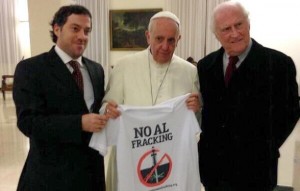 Posted on the Corner last week:
Posted on the Corner last week:
The Economist clearly cannot wait to see the forthcoming encyclical on the environment:
Could Pope Francis become the world’s foremost campaigner on global warming? That is certainly the fondest hope (or in a few cases the darkest fear) of a lot of people who are closely involved in deliberations over the planet’s future. Ban Ki-moon, the UN secretary-general, met the pontiff today and shared his mounting concern over the outcome of the Paris summit on climate change in December which is widely seen as the last opportunity for a global deal to manage carbon emissions and set some limit to rising temperatures.
Immediately afterwards, the Pontifical Academy of Sciences, an important part of the Vatican’s intellectual armoury, convened a brainstorming session with the UN secretariat and a gaggle of NGOs, including the New-York based Earth Institute, a study centre which advises the UN on sustainable development: at the Vatican’s behest, the agenda included not just climate change but forced migration and human trafficking, a scourge which has been exacerbated by desertification.
Elsewhere in the Italian capital, some strident climate-change sceptics from the Heartland Institute, a right-wing American organisation devoted to spreading climate-change scepticism, were urging the Pope not to believe in man-made global warming; the institute insists that claims of a human contribution to heating the planet are unfounded, and that proposals to mitigate climate change amount to “shutting down” the world economy.
This offers a hint of the flak that Pope Francis can expect from the religious right, including many Catholics, when he visits America later this year…
In keeping with the tone of what is a cleverly one-sided article, it is, I notice, only skeptics who earn that adjective “strident”.
Over at Breitbart, James Delingpole, who seems to have traveled to Rome in, well, “strident” company, describes a somewhat stage-managed press conference held at the Vatican with Ban-Ki Moon, but perhaps the most interesting item in his report are these comments from the UN Secretary-General:
I don’t think faith leaders should be scientists…What I want is their moral authority. Business leaders and all civil society is on board [with the mission to combat climate change]. Now we want faith leaders. Then we can make it happen.
All civil society? That may not be strident, but it’s certainly an exaggeration and, when you stop to think about it, just a little bit sinister.
Meanwhile this document has come out of the Pontifical Academy of Sciences. Here’s just one sentence that caught my eye:
The problem is not one of how well our children and grandchildren will fare in the world of the future, but whether civilization as we know it can be extended beyond the next 100 years.
Strident?
And the beginning of another sentence:
Our problems have been exacerbated by the current economic obsession that measures human progress solely in terms of Gross Domestic Product (GDP) growth…
Solely?
Strident much? But take the time to read the whole thing.
As you do so, remember that, for all the scientific discussion (which concerns not only what may or may not be going on, but what should be done about it) and the religious ‘frame’ within which the argument is set out, this is also a profoundly political document and, as such, it must, at least partly, be judged.
